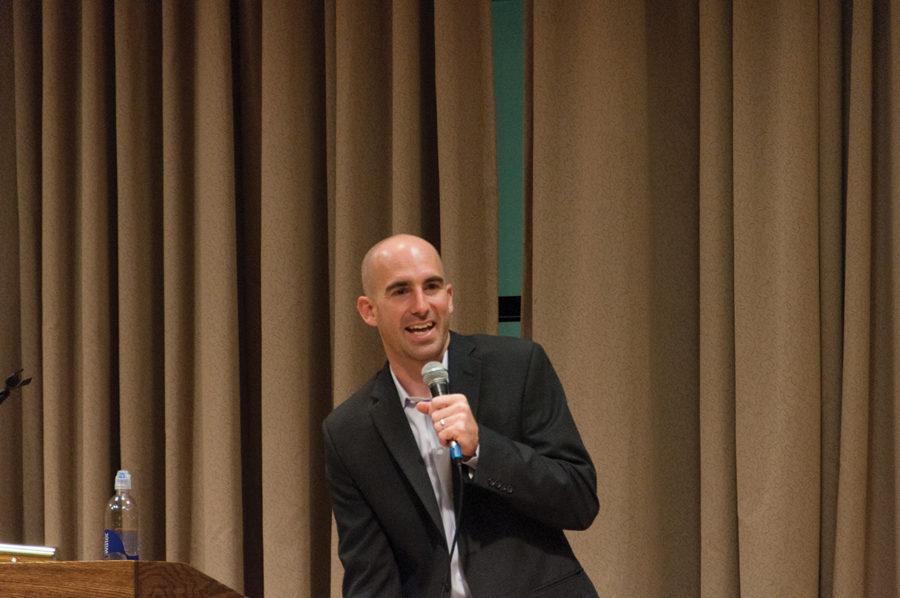‘Living the Spectrum,’ writer David Finch encourages love, acceptance with Asperger’s
October 16, 2012
One man has used his Asperger’s syndrome diagnosis as a way to adapt his life.
David Finch, writer and speaker, came to Iowa State on Tuesday, Oct. 16, to present his lecture “Life on the Spectrum,” regarding Asperger’s syndrome.
“Despite abnormality, people can fulfill their roles, especially if they find love, understanding and guidance,” Finch said quoting Hans Asperger, who named the syndrome in 1944.
Each is essential, Finch explains, but he believes Hans had left out one thing: adaptability.
Finch describes adaptability as “a willingness to radically change your behaviors, to unlearn your old behaviors that might have been holding you at a disadvantage maybe your whole life and to learn new behaviors.”
Finch describes Asperger’s syndrome as a relatively mild form of autism.
After Finch got his first book published, “The Journal of Best Practices,” he began to get feedback from many readers. Beginning with women, many of them wives, that had written to say the book had given them a new sense of hope for their relationships.
Then the husbands began to send emails claiming their wives made them read it, but they were happy they read it and enjoyed his stories.
The most humbling for Finch were emails from the parents of children with Asperger’s syndrome. Parents were writing to say thank you for the advice and the new-found hope for their children.
“What often happens is when you receive that autism spectrum diagnoses, whether it’s Asperger’s syndrome, pervasive development disorder, autism, high functioning autism, whatever it is, it’s usually not a situation where a physician sits down across from you face-to-face and says, hold on to your hat. ‘I have great news for you,'” Finch said. “It’s often a gloom and doom scenario.”
As Finch grew up, his classification was “nerd.” Now looking back to his past, before he knew of his diagnosis Finch realizes some of the parallels he had with Asperger’s syndrome.
Finch’s first day of first grade, his teacher assigned him and his fellow students to simply glue Popsicle sticks to a piece of paper. He said it sounded easy enough but he couldn’t seem to do it. This was because he could only focus on the sounds and the visuals around him.
Those sounds were the clock ticking, the lights flickering and buzzing, the subtle southern accent of his teacher’s voice, and the chalk clicking against her ring.
Finch continued to explain that when his teacher looked at him, she thought he must be a visual learner. So, in order to help him understand the project further, she went to the chalkboard.
Finch, joking and laughing, explained how his teacher’s body moved, the bits of chalk falling down the board and her way of writing letters compared to the letters on the posters in the classroom were all further distractions.
Finally Finch’s teacher came to him and used what he explained as hand-over-hand help. Finch was hearing everything the teacher had been saying, but not processing it due to the distractions only he noticed.
After Finch was diagnosed in 2008, he and his wife, Kristen, a speech and language pathologist, understood what to do next. Finch decided that night he would get rid of Asperger’s syndrome completely. He was going to beat it in six months.
“You’re not broken. You are not flawed. It’s our relationship that’s broken. It’s our relationship that’s flawed,” Kristen told David when he told her his plan to “beat” the syndrome. “Asperger’s makes you who you are, and I wouldn’t want you wired any other way because now I know it, and it makes you so special.”
Finch began to understand Hans Asperger’s idea of love, understanding and guidance, and began applying them to his marriage. He’d ask things in order to adapt such as how to be better at conversations, and how to better act in certain social activities.
“Now I’m finally fulfilling my role, just like Hans Asperger said I might,” Finch said. “As a dad, as a husband and as a person.”
Positive feedback from the lecture came from the entire audience.
“[Finch] took that topic of Asperger’s and Autism, which is sort of a touchy topic for a lot of people,” said Libby Sweeney, member of the Committee on Lectures. “No one really wants to acknowledge the disabilities, and it was really humor filled. He approached it in a way that made people feel comfortable, but still it was extremely informative.”
Steve Moats, director of Iowa State’s Student Disability Resources, agreed with Sweeney’s sentiment.
“It was a great message: love, understanding, guidance and adaptability,” Moats said. “That’s something we all need to hear.”
The lecture was sponsored by Disability Awareness Week, the College of Engineering, Human Development and Family Studies, the School of Education, Student Disability Resources, the University Committee on Diversity and the Committee on Lectures (funded by the Government of the Student Body).







